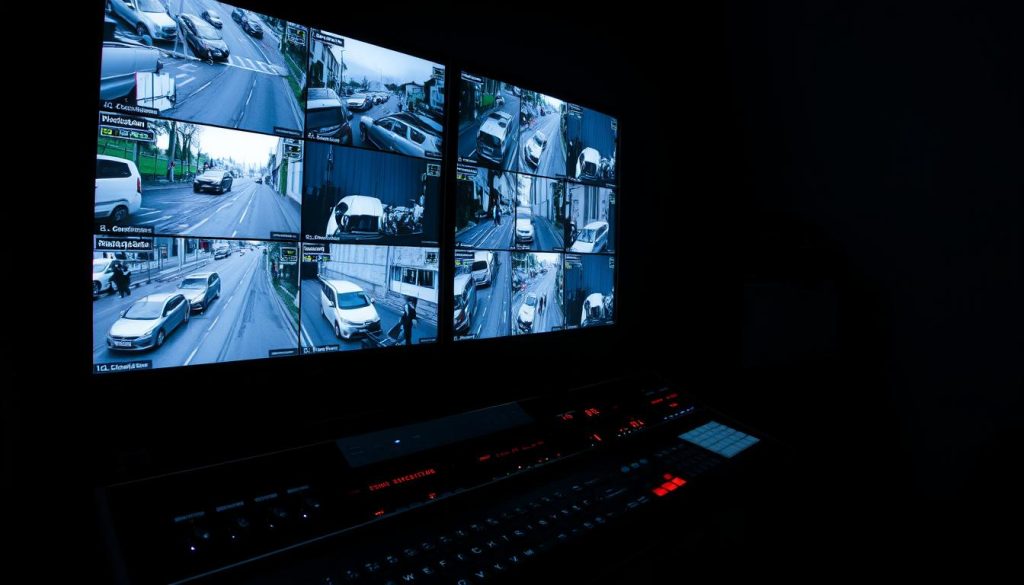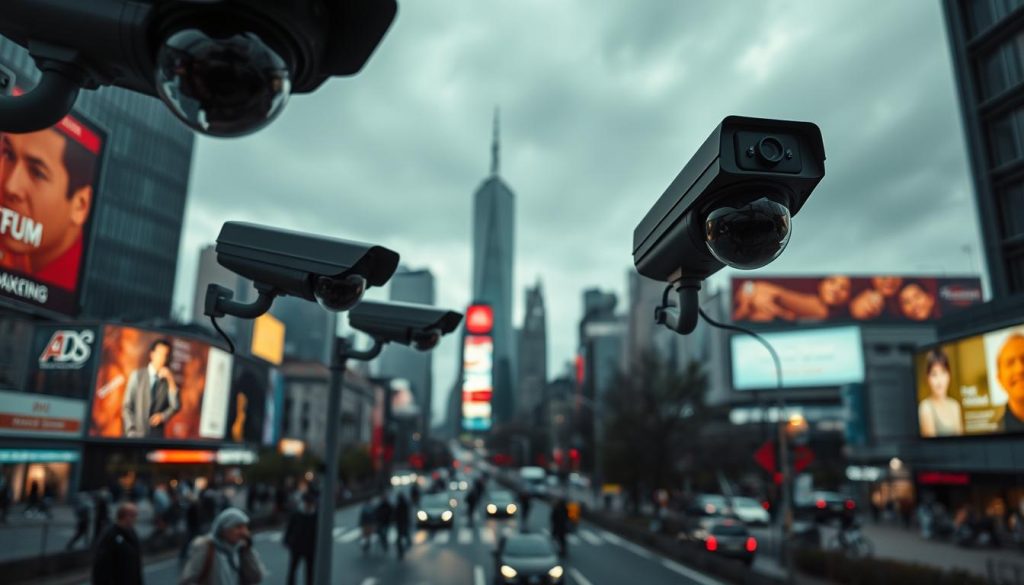CCTV cameras are key in today’s security for homes and businesses in Singapore and worldwide. It’s important to know if these systems record all the time. Many think CCTV cameras always record, but it’s not always true. This depends on the camera type and settings.
This section will explore how CCTV cameras work. We’ll look at when they record, whether they’re on or off.
Key Takeaways
- CCTV cameras are not always recording; functionality depends on settings and type.
- Surveillance systems can have varying recording modes.
- Power source significantly impacts recording capabilities.
- Understanding CCTV functionality aids in effective security planning.
- Operational context must be clarified for accurate surveillance use.
Understanding CCTV Camera Functionality
CCTV cameras are key to improving security by watching and recording all the time. Knowing how they work means understanding their parts, like the power supply for CCTV. This power keeps them running well, whether they’re plugged in or battery-powered.
How CCTV Cameras Work
CCTV cameras capture video and send it for recording and watching. New tech like infrared sensors helps them start recording only when there’s movement. This saves space and makes surveillance more efficient.
Importance of Power Supply
A steady power supply for CCTV is vital for good surveillance. Any power issues can cause missing footage, which is bad for security. To avoid this, using things like Uninterruptible Power Supplies (UPS) is smart. They keep cameras working even when the power goes out. Companies like Reolink show how important reliable power is for CCTV systems.
Can CCTV Cameras Record When They Are Switched Off?
CCTV cameras vary in power dependency, affecting their recording abilities. Wired systems need constant power to work. But, modern battery-operated CCTV offers flexibility in power use.
Power Dependency of CCTV Cameras
Traditional CCTV cameras need a steady power source. When turned off, they stop recording right away. Knowing this is key for anyone looking into surveillance systems.
The Role of Rechargeable Batteries
Some models with rechargeable batteries offer a different solution. For instance, the Reolink Argus series shows battery-operated CCTV can keep recording during power outages. This ensures some surveillance even when electricity is lost.
What Happens When a CCTV Camera Is Turned Off?
Knowing what happens when a CCTV camera is turned off is key for good surveillance. When a camera is off, it stops recording and monitoring right away. This makes the area open to unauthorized access or incidents.
Instant Cessation of Recording
When a CCTV camera is turned off, all recording stops. You can’t use recorded footage to solve security issues anymore. This sudden stop highlights the need for constant power for good monitoring.
The Impact of Motion Detection
Motion detection is a big part of CCTV systems. But when a camera is off, motion detection fails. This means the system can’t spot movement, leading to security risks. It shows how important a steady power source for cameras is.
CCTV Camera Features That Affect Recording
CCTV cameras work well because of their special features. Knowing about different types of CCTV cameras is key for any surveillance setup. Each camera has features like resolution, field of view, and weatherproof designs. These features make the cameras perform better.
Types of Cameras and Their Capabilities
Choosing the right CCTV camera is very important for security systems. There are several types:
- Dome Cameras: These are small and great for indoor use.
- Bullet Cameras: Long and visible, perfect for outdoors.
- PTZ Cameras: You can move these cameras remotely for better coverage.
- Wireless Cameras: Flexible and need internet for surveillance.
Each type has its own special features. These features help meet different surveillance needs.
Influence of Internet Connectivity on Recording
For modern surveillance, a strong internet connection is key. Smart cameras use the internet to store video online. A good internet connection makes remote access better and ensures cameras work well.
Good internet is important for CCTV cameras to record well. For more on CCTV cameras, check out recording when switched off.
Identifying Active CCTV Cameras
Figuring out if CCTV cameras are recording requires looking at different signs. Knowing how to spot these signs makes monitoring cameras easier and boosts security.
Visual Indicators of Functionality
Visual signs are key when checking CCTV cameras. Here are some common ones:
- Steady Green Light: Means the camera is working right.
- Flashing Red Light: Shows a problem or recording.
- Off Light: Means the camera isn’t working.
Using Software to Check Status
Using advanced surveillance software tools helps manage cameras better. These tools have features like:
- Real-time monitoring of camera activity.
- Access to recorded footage for review.
- Alerts for unusual activity.
These tools help spot active CCTV cameras and give a full view of the system’s performance.
Are CCTV Cameras Always Recording?
CCTV cameras are key in security systems. They have different recording modes to improve surveillance. Knowing these modes helps users set up their systems to fit their security needs. The main recording modes are continuous, motion-activated, and event-triggered.
Recording Modes Available
Continuous recording captures video all the time. It’s great for watching busy areas. But, it uses a lot of storage space.
Motion-activated recording saves space by starting to record only when it sees movement. It’s good for places where not much happens.
Event-triggered recording is flexible. It lets users set cameras to record specific actions. This way, it saves space while keeping important footage. Each mode has its own benefits and can be chosen based on a location’s needs.

Considerations for Surveillance Setup
Setting up surveillance needs careful planning and smart execution. Where you place CCTV cameras is key to good coverage. Knowing your environment well helps find the best spots for watching over things, making your space safer.
Placement of Cameras for Maximum Coverage
When setting up CCTV cameras, keep these tips in mind for better monitoring:
- Look at the area’s layout to spot any blind spots.
- Think about how people move to know where to watch closely.
- Identify areas at risk that need extra attention.
- Make sure cameras can see well but also respect privacy.
Having reliable power and strong internet is vital for camera work. Check these systems often to keep your surveillance running smoothly. This boosts your security setup’s effectiveness.
Implications of Turning Off CCTV Cameras
Turning off CCTV cameras can have big legal and technical problems. It’s key for businesses and groups to know these issues. This helps them follow rules and keep their surveillance systems working well.
Legal Considerations
The laws around surveillance are tricky. Shutting off CCTV cameras in public might break privacy laws. This could put people at risk who could have been protected by cameras. Groups need to know the local rules on watching people to stay out of trouble.
Technical Implications of Power Loss
Stopping CCTV systems can cause many technical issues. Turning off cameras might mean losing important video, which is bad for safety in emergencies. Keeping systems running by checking and fixing them often helps avoid these problems.
Best Practices for CCTV Maintenance
Regular CCTV maintenance is key to keeping your surveillance system working well. By following CCTV maintenance tips, you can ensure your cameras are always ready to protect. Start by doing routine checks on power and connections to keep everything running smoothly.
It’s also important to keep your CCTV software and firmware updated. This helps avoid security risks. Keeping records and making backups regularly can help fix problems quickly. Plus, using surge protectors can protect your cameras from power surges, making them last longer.
Lastly, think about hiring experts for thorough maintenance. Professional technicians can spot and fix issues before they become big problems. This way, your CCTV system will work better and keep your place safer.

